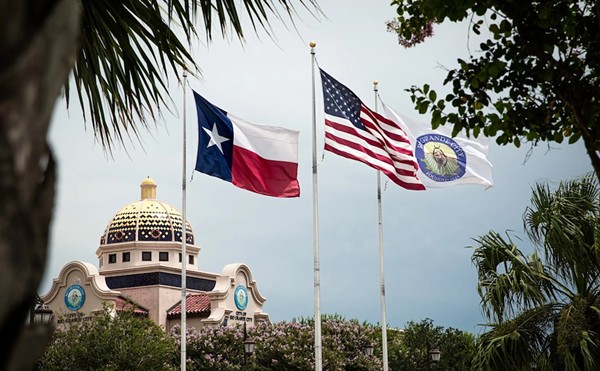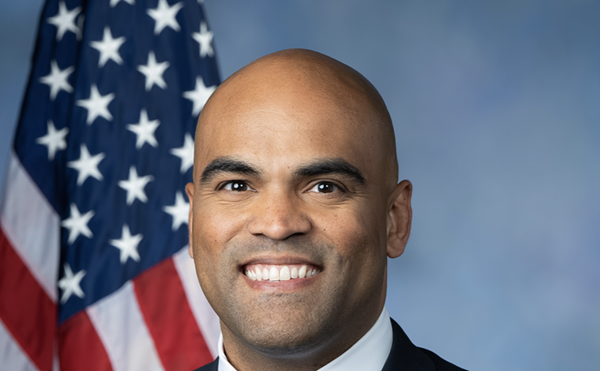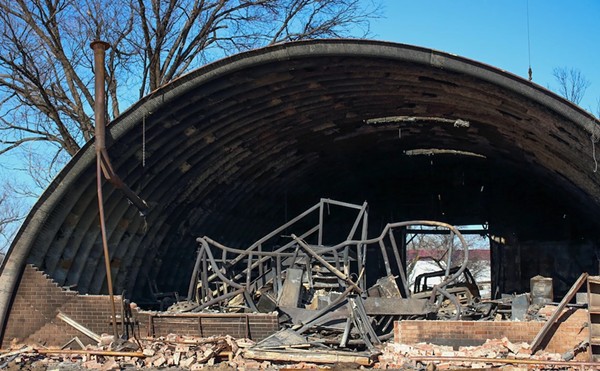Ojeda is from Nuevo Laredo, Tamaulipas, Mexico, where the world's first maquilas opened in 1965, following the end of the bracero program that had fed cheap Mexican labor to the United States. "My mom was part of the first generation of the maquilas. I was part of the second," says Ojeda, who spent most of her life working in the foreign factories that proliferated along the U.S.-Mexico border. "Nuevo Laredo was the laboratory for NAFTA, just as today, Mexico is the laboratory for FTAA `Free Trade Agreement of Americas`."
At first, there were only a few maquilas in Mexico. Then there were hundreds. When the North American Free Trade Agreement kicked in on January 1, 1994, there were thousands of these factories, boasting a workforce that peaked at about 1.4 million people.
In NAFTA's early years, the mainstream media foresaw a golden age. Their predictions hardly described today's deindustrializing, post-bubble U.S., where factory jobs are splitting for China, and even Business Week admits that economic inequality is rising. Nor did they foresee the savage inequalities of today's Mexico, the Mexico of Y Tu Mamá También. The official story was: Everyone will benefit.
Mexico supposedly would bootstrap itself to First World status by relying on the maquilas - plants operated in Mexico by foreign corporations. Everything critics complained about was supposedly temporary: the dirt wages, infernal working conditions, toxic run-off, discrimination and harassment directed at the maquilas' mostly-female workforce. The media ignored a yet more radical criticism: that NAFTA wasn't even designed to raise general standards of living - but rather to transfer wealth from the working class to the multinational corporations, NAFTA's real beneficiaries.
Today, super-NAFTA is coming. The Free Trade Agreement of the Americas will create a single economic free-fire zone from Hudson's Bay to Tierra del Fuego. Of course, it's capital that gets to move freely within this hemisphere; if you're a working stiff, expect to encounter tough guys and, (before long), retina-scanners at the newly-militarized U.S. borders. Originally, FTAA's implementation was set for 2005, but President Bush, on a roll, is pushing for 2004.
Millionaire Fox News "analysts" are all for it. But Marta Ojeda is among free trades' critics - many of whom survived years working in the maquilas. In the '70s, too poor to afford school, Ojeda started working at Transitrón Mexicana, a maquila that supplied General Electric. When it closed suddenly, Ojeda and her mother were among thousands stiffed for wages they had already earned. These workers knew of no legal recourse. Nuevo Laredo was the ultimate pro-maquila town.
Starting high school on scholarship, Ojeda was soon recruited by another maquila, a Johnson & Johnson subcontractor. Sticking with school, she worked nights, sometimes pulling double shifts. Ojeda's girlhood was spent "within those four walls, listening to the noise of machines." Workers made blue hospital gowns, under surreal working conditions. "The air was blue," recalls Ojeda. Blue particles entered workers' eyes and nostrils. At lunchbreaks, they found their tongues were coated blue. Ojeda's fellow workers demanded the company issue them inexpensive protective masks, and made Ojeda their representative.
Company management, as Ojeda recalls, replied, "Listen, you guys, keep fighting for benefits and we're gonna move to Ciudad Juárez. There's no law there, no unions, nothing." The workers persisted, and management - which begrudged them those cheap surgical masks - made good on their threat.
In 1979, the Sony Corporation arrived in Nuevo Laredo as Magnéticos de México (MDM). Staying in school, Ojeda went to work again, making computer disks and cassette tapes. But management started busting everybody's chops, and once again Ojeda's friends called on her. In theory, workers had a union; in practice, they didn't. MDM's "union" was part of the Confederación General de Trabajadores, the labor arm of Mexico's long-ruling PRI party. This "union" and MDM worked together, while the voices of the workers went unheard.
The workers realized that they needed more firepower, so they scraped together the money to send Ojeda to law school. They took weekly collections at the plant and raised money any honest way they could. Still working nights, Ojeda endured a five-year law program, first in Saltillo, then at the Centro de Estudios Universitarios in Monterrey.
Her friends needed her. When activist MDM workers assembled an independent slate to run for union office, they were fired. When they tried to form an independent union, they found themselves up against the Mexican government - tangled in various laws and regulations designed to perpetuate the PRI.
Still, by the early '90s, Ojeda and friends had formed independent labor unions in most Nuevo Laredo maquilas. The one at Sony became their fifteenth. The old order raged. The late Fidel Velásquez, CGT's legendary bossman, threatened Ojeda to her face, predicting she
| "The air was blue," recalls Ojeda. Blue particles entered workers' eyes and nostrils. At lunchbreaks, they found their tongues were coated blue. |
Ojeda, meanwhile, was indicted by Tamaulipas state on trumped-up charges of "destabilizing" the maquila industry. "We need you alive," Ojeda was told by her fellow workers, who feared she might be "disappeared" in prison. Ojeda entered the U.S., where she soon encountered the Coalition for Justice in the Maquiladoras, a San-Antonio based nonprofit coalition of about 100 labor, church, environmental, community, and women's groups from Mexico, the United States, and Canada.
Ten years later, NAFTA hasn't delivered. Disastrous peso devaluations have wiped out the confident Mexican middle class of the '70s. It now costs three times as much to repay the loans Mexicans once took out for cars, homes, and educations. "People lost everything," says Ojeda. "In Mexico today, you're either rich or you're poor. Medium and small enterprises are disappearing."
So are the ejidos, Mexico's traditional agricultural communities. Following NAFTA, Mexico is phasing out agricultural subsidies - just as it's being flooded by the products of government-subsidized U.S. agribusiness. On January 31, Ojeda participated in a Mexico City rally of 300,000, organized by El campo no aguanta más (loosely translated as The Farmers Aren't Going to Take It Anymore). By now, ex-farmworkers were supposed to hold jobs elsewhere in Mexico's revitalized economy. But despite NAFTA's promises, these jobs don't exist.
"Maquilas are leaving Mexico," says Ojeda, "They are taking off for China or Panama." Maquila-caused social and environmental devastation remains behind. The remaining maquilas often won't pay the government-mandated minimum wage or, like their counterparts in the U.S., will demand "givebacks" from workers barely surviving on the ragged edge. Mexico's workers, like those in the U.S. before them, are being abandoned.
Realistic in the short run, Ojeda remains optimistic for the long term. In her wide-ranging work for CJM, she has seen a global countermovement building. By all accounts, this year's World Trade Organization meeting at Davos, Switzerland, was grim. Recognizing its credibility problem, W.T.O.'s theme was: "Building Trust." For the third year running, Ojeda attended the anti-W.T.O. people's conference in Porto Alegre, Brazil - blessed this year by Luiz Ignácio "Lula" da Silva, the charismatic former metal worker just elected to Brazil's presidency in a landslide election. Porto Alegre, living up to its name, was a party.
Ojeda doesn't need lessons from anyone about how rough it is out there. But she still believes that another, better world is coming. "That's not the question," she says. "It's just a question of time." •


















